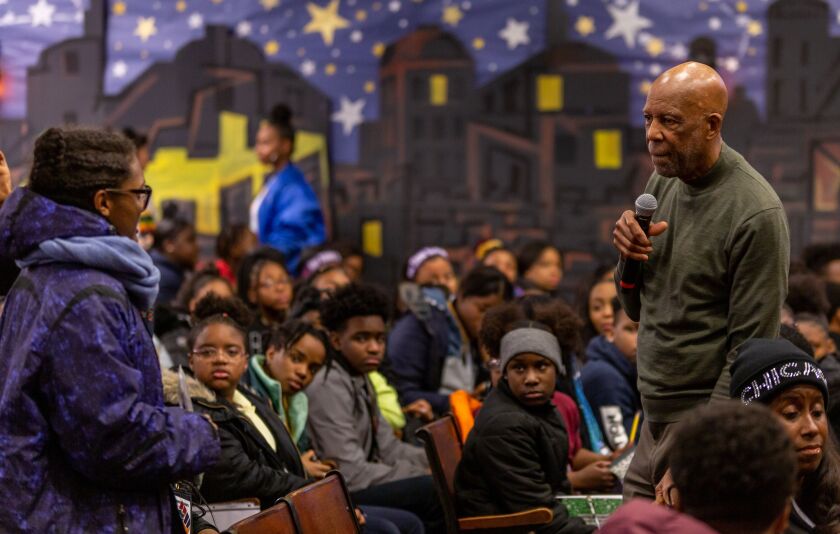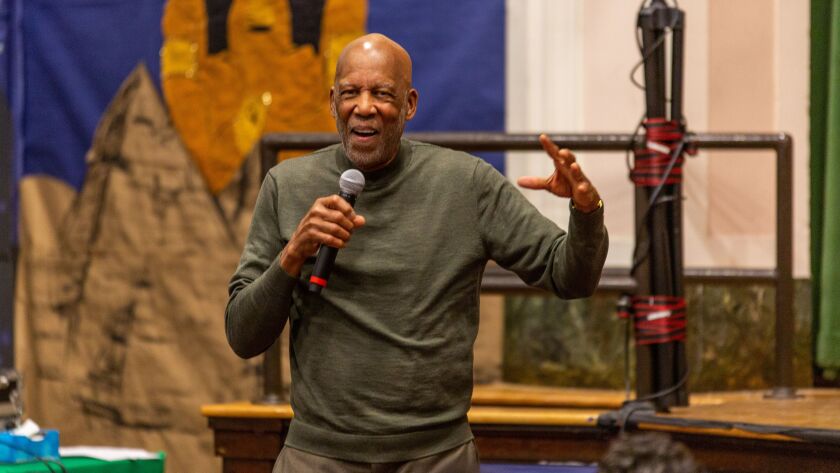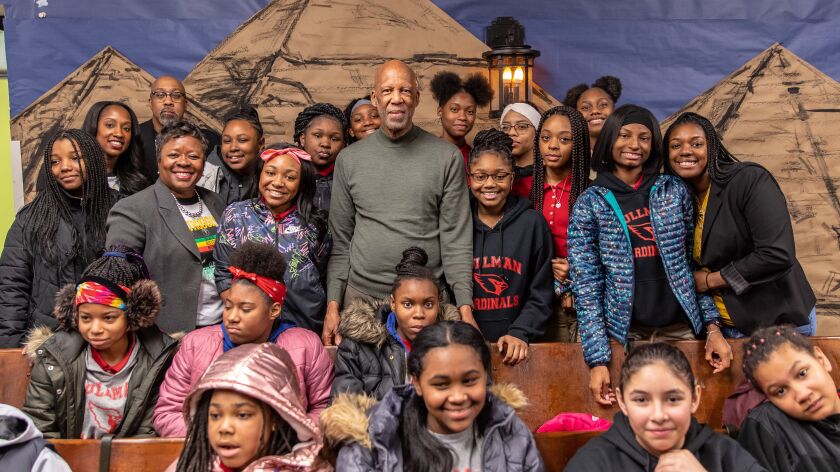Terrence Roberts was 15 when he volunteered to be one of the Little Rock Nine — African American students who would desegregate one of the nation’s largest schools, Little Rock Central High School in Arkansas, in the wake of the landmark Brown vs. Board of Education case.
Today a respected psychologist — a former assistant dean at University of California Los Angeles, now retired — the 78-year-old held rapt some 300 Chicago Public Schools students this week at an assembly that brought them face to face with living history.
Roberts’ visited as part of a CPS partnership with Facing History and Ourselves, a global nonprofit that develops educational materials on historic incidents of racial prejudice and injustice, helping teachers teach and talk to students about those difficult subjects.
“From first grade, I learned that I lived in a country that didn’t like me, that had laws against the likes of me, laws that said, ‘Terry Roberts, you don’t count for much. In fact, you have entered our society clothed in black skin. Did you not know that black skin is not a proper covering for a real human being?’ ” Roberts told wide-eye students from eight schools, who were so quiet you could hear a pin drop Tuesday at Fernwood Elementary, 10041 S. Union Ave.
“I didn’t believe it anyway. I understood that I was indeed a person of import, in need of respect and love that society wasn’t prepared to give me. So I had to find out how to get it for myself,” said Roberts, who with the other members of the Little Rock Nine was awarded the Congressional Gold Medal in 1999.
“You need to know about this, because you need to prepare yourself for not only the ‘Little Rocks’ that you will bump into along the way — because there will be many — but also to give you the satisfaction of knowing that no one else can define who you are except you.”

Students asked many questions of Terrence Roberts, one of the Little Rock Nine students who desegregated Little Rock Central High School in 1957, at an assembly of several Chicago Public Schools on Tuesday at Fernwood Elementary, sponsored by the nonprofit Facing History and Ourselves.
Chicago Public Schools
Roberts, author of the 2009 memoir, “Lessons from Little Rock,” and a 2010 collection of essays and speeches, “Simple, Not Easy,” went on to recall the 1957 experience and the lessons it provided for a life of civil rights activism. A California native, he received his Ph.D. in psychology from Southern Illinois University in 1976.
“Facing History and Ourselves works with teachers and students to use the tools and lessons of history to stand up against racism, bigotry and hatred, and we were so excited to bring one of the Little Rock Nine to the South Side,” said Maureen Loughnane, executive director of the nonprofit’s Chicago office, in its second year of the partnership with CPS.
“We are training teachers across the entire city to use our curriculum in their classrooms, and one of the curricula is our civil rights unit,” she said. “We did a training last month for teachers from those eight Roseland area schools, and the event came out of it — to be able to have the students really connect with that history and be inspired by it, and to think about their lives and how to transform themselves and their world and take civic action.”

Terrence Roberts, one of the Little Rock Nine students who desegregated Little Rock Central High School in 1957, shared his story and lessons it provided for a life of civil rights activism, at an assembly of several Chicago Public Schools on Tuesday, sponsored by the nonprofit Facing History and Ourselves.
Chicago Public Schools
And the students were clearly engaged, as Roberts shared his story in the simplest terms.
On Sept. 4, 1957, in a test of the Supreme Court’s landmark 1954 Brown v. Board of Ed ruling declaring segregation in public schools unconstitutional, the Little Rock Nine attempted to enter the all-white high school. They were stopped by an angry mob and the Arkansas National Guard, under orders from Gov. Orval Faubus.
The same thing happened on a second try on Sept. 23, 1957, photos of the angry mob of some 1,000 white protesters etched in history. It was on Sept. 24, 1957, that President Dwight D. Eisenhower took control of the National Guard and the nine were allowed in.
Soldiers would accompany the students the entire school year but could not prevent their being beaten, kicked, spat at, receiving death threats and abuse daily, like the time a white student threw a combination lock at Roberts’ head, knocking him near unconscious.

After a talk by Terrence Roberts, one of the Little Rock Nine students who desegregated Little Rock Central High School in 1957, at an assembly of several Chicago Public Schools on Tuesday, students peppered Roberts with questions showing both immense curiosity and their own insight.
Chicago Public Schools
Afterward, the students peppered Roberts with questions showing both immense curiosity and their own insight.
“Did you have fear attending an all-white school?” “Did your white teachers treat you as if you were inferior?” “How did you feel when that lock was thrown at your head?” “Did any of the teachers try to harm you?” “How did you cope with the names and all that stuff they were saying about you?” “Was there any advantage to attending an all-white school?”
Roberts, who with the other eight students were personally invited by President Barack Obama as guests of honor at his historic 2008 inauguration, poignantly answered all.
“We were there to challenge the ideology of racism. We were there to provide an example that was different from the examples they had in their heads. That was one of the reasons we went there. We had an opportunity to help people consider the option of becoming better human beings if they so desired,” he said. “Not all of them did.”

Terrence Roberts, one of the Little Rock Nine students who desegregated Little Rock Central High School in 1957, takes a photo with students after speaking at an assembly of several Chicago Public Schools on Tuesday at Fernwood Elementary, sponsored by the nonprofit Facing History and Ourselves.
Chicago Public Schools
On May 25, 1958, one of the nine, Ernest Green, would become the first African American graduate of Little Rock Central, with civil rights leader Dr. Martin Luther King, Jr. attending the graduation ceremonies.
At the end of that school year, Faubus closed all of Little Rock’s high schools. The other eight members of the Little Rock Nine continued school via correspondence or at other schools, Roberts’ family moving to Los Angeles.
“This was absolutely historic. Students had an opportunity to see an icon in the flesh,” said Cheryl Watkins, CPS chief of Network 13 that encompasses the schools at the assembly.
“I hope they walk away with knowledge of how to respond to injustice, to situations that might be unpleasant, how to respond to violence. I hope they model his behavior, and remember that ‘No one can make you angry. It’s about how you choose to respond,”’ she said.
“I turned around and said to some students, ‘Are you excited?’ One said, ‘Absolutely!’ I said, ‘Are you just telling me that, or do you really mean it?’ She said, ‘My teacher taught us about him, and now we’re actually seeing him. I can’t believe it.’ That was enough for me.”






